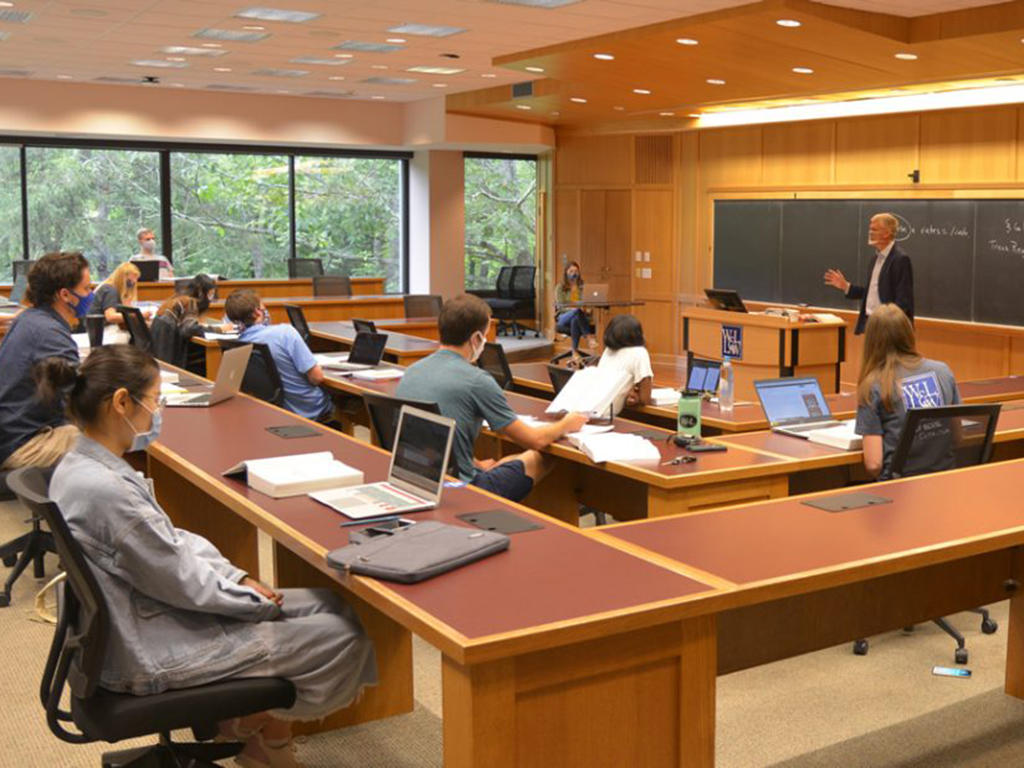The COVID-19 pandemic disrupted legal education like nothing else before. It presented a host of challenges, affecting everything from class formats to post-graduate employment. But while the future job market is still unknown, legal educators say most schools have adapted and should offer good, challenging, educational experiences.
“(Legal education) will be more difficult. No doubt about it,” said Andrew McClurg, a professor at The University of Memphis – Cecil C. Humphreys School of Law and author of “1l of a Ride,” a book about the first year of law school. “That was already shown in the spring semester. A lot of students and professors struggled emotionally.”
But this doesn’t mean students are in for a poor experience this fall. Most law schools spent the summer perfecting their curricula. Some schools plan to go completely online, including Harvard Law School; University of California, Berkeley, School of Law; University of California, Irvine School of Law; and Vermont Law School. Many others are taking a hybrid approach, with large classes online and smaller, experiential classes on campus.
Students will play a key role, attitude-wise, in whether the year is a success.
“Law students are tougher than some people give them credit for, and most law professors are dedicated teachers, so I suspect we’ll all find a way to make it work,” McClurg said.
Rosario Lozada, a professor at Florida International University College of Law, said students can expect Fall 2020 to be hard. The additional stressors will require students to be especially attentive to their health and well-being, she noted.
“Law students are well advised to prioritize self-care because lawyers often end up taking on other people’s stress, sort of like human shock absorbers,” Lozada said.
Many law schools have been helping students deal with unexpected issues brought on by the pandemic. Several have set up emergency funds, which can be used to help students pay for critical needs, such as Wi-Fi and computer upgrades.
Even food needs are being considered, as is gas money for students needing to get to medical care. At City University of New York School of Law, students could be eligible for emergency grants of up to $1,500.
AccessLex Institute, a nonprofit that helps law students transition to professional careers, created a $5 million Law Student Emergency Relief Fund. Each ABA-approved school could seek as much as $25,000 to donate to students.
Schools have also reached out to alumni and law-affiliated organizations for help. The pandemic nixed many summer job opportunities, so they asked if any jobs could be had, last-minute.
At least two law schools, New York Law School and Maurice A. Deane School of Law at Hofstra University in Hempstead, N.Y., offered special summer courses.
New York Law School’s eight-week online program was designed to give 120 law students a taste of the Big Law summer associate experience. The Venable law firm partnered with the school, and all the assignments were focused on COVID-19 challenges.
Students who completed the program earned three experiential learning credits toward graduation. Program tuition and fees were paid for by alumni donors.
“The pandemic understandably altered summer opportunities for students, many of whom saw summer jobs or externships vanish,” said Anthony Crowell, New York Law School dean and president. “Creative minds came together to create a first-rate experience to advance our students’ knowledge, skills and professional networks and profiles.”
New York Law School hopes to do similar programming in the future.
Hofstra University offered a free, 10-week Summer Skills Institute, which included online training modules in legal technology, transactional law and litigation. The institute was modeled after programs offered by leading law firms to train their summer and junior associates. More than 130 students registered for one or more of the free classes that were offered online.
“Employers want to hire students with real-world skills and who add value by identifying issues, said Chris Caruso, senior associate dean for career services and compliance. “(This program) will provide students with added practical skills . . . and give students a leg up by familiarizing them with documents and issues that might not be covered in a traditional law school class.”
It is unclear how depressed the post-graduate employment market will be, but many schools are putting more emphasis on helping students prepare for the job hunt.
Sandra Day O’Connor College of Law at Arizona State University starts early — even before the first semester begins. In July, newly admitted students are sent an online assessment to identify law specialties they might be interested in pursuing.
When they hit campus, more work is done.
“First, we require first-year students to participate in a professional development seminar,” said Ray English, assistant dean of career and employment services.
“Second, we help students put their best foot forward by ensuring resumes and cover letters are well thought through. We also work to prepare students for interviews, ensuring they are versed in best practices for summer positions.
“Third, we focus heavily on developing externship/internship opportunities with firms and corporations. Collectively, our students participate in over 200 externships during the fall and spring semesters, and about one-third are with law firms and corporations.”
Fordham University School of Law in New York turns to its alumni to help finding job openings.
“We truly have what we call The Network Effect,” said Jayne Schreiber, assistant dean of career planning at Fordham.“Our alumni, numbering over 21,000 and working in over 80 countries around the globe, really care about our students and want to do everything they can to assist them as they head into the marketplace.”
In addition, students can gain practical experience in one of Fordham’s many centers or clinics, she said.

